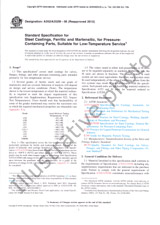We need your consent to use the individual data so that you can see information about your interests, among other things. Click "OK" to give your consent.
ASTM C639-15(2020)
Standard Test Method for Rheological (Flow) Properties of Elastomeric Sealants
Translate name
STANDARD published on 1.5.2020
The information about the standard:
Designation standards: ASTM C639-15(2020)
Note: WITHDRAWN
Publication date standards: 1.5.2020
SKU: NS-993139
The number of pages: 3
Approximate weight : 9 g (0.02 lbs)
Country: American technical standard
Category: Technical standards ASTM
The category - similar standards:
Annotation of standard text ASTM C639-15(2020) :
Keywords:
flow, rheology, sag,, ICS Number Code 91.100.50 (Binders. Sealing materials)
Additional information
| Significance and Use | ||
|
5.1 The results obtained from this test method are simply a measure of the degree of horizontal or vertical flow of single-component or multi-component sealants when applied to a set joint configuration at two pre-determined temperatures. Only samples conditioned at the same temperature may be directly compared. |
||
| 1. Scope | ||
|
1.1 This test method describes a laboratory procedure for the determination of rheological (flow) properties of single- and multi-component chemically curing sealants for use in building construction. 1.2 Other suitable flow characteristics may be agreed upon between the seller and purchaser or specifier. Special non-sag properties and lower flow characteristics may be required for use in sloping joints where absolute leveling is not desired. Note 1: The sealants are supplied in various rheological
properties ranging from pourable fluids to stiff non-sagging
pastes. Multi-component sealants are supplied as a base component
with an activator or curing agent separately packaged. After mixing
the multiple parts, the sealant is ready for application.
Single-component sealants are supplied ready for use upon opening
of the package and usually depend on the external environment for
cure.
1.3 This test method describes four types of joint sealants: 1.3.1 Type I—Single-component flowable or self-leveling, 1.3.2 Type II—Single-component non-sag, 1.3.3 Type III—Multi-component flowable or self-leveling, and 1.3.4 Type IV—Multi-component non-sag. 1.4 The values stated in SI units are to be regarded as the standard. The values given in parentheses are for information only. 1.5 This standard does not purport to address all of the safety concerns, if any, associated with its use. It is the responsibility of the user of this standard to establish appropriate safety, health, and environmental practices and determine the applicability of regulatory limitations prior to use. 1.6 This international standard was developed in accordance with internationally recognized principles on standardization established in the Decision on Principles for the Development of International Standards, Guides and Recommendations issued by the World Trade Organization Technical Barriers to Trade (TBT) Committee. |
||
| 2. Referenced Documents | ||
|
We recommend:
Updating of laws
Do you want to be sure about the validity of used regulations?
We offer you a solution so that you could use valid and updated legislative regulations.
Would you like to get more information? Look at this page.




 Cookies
Cookies
